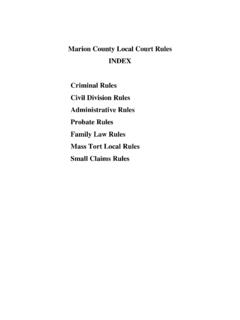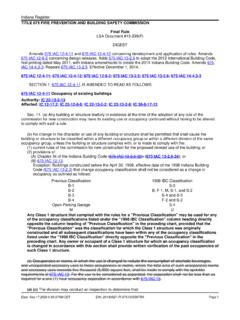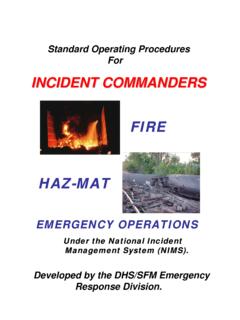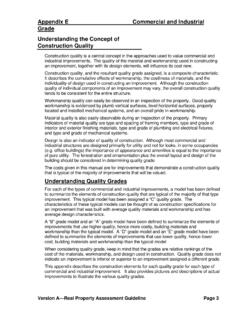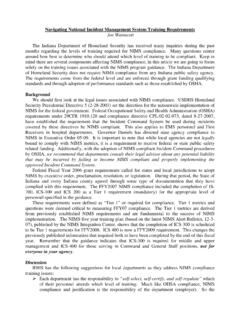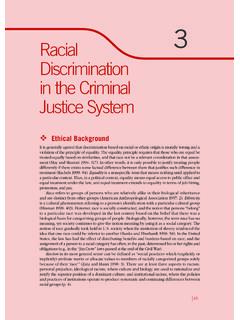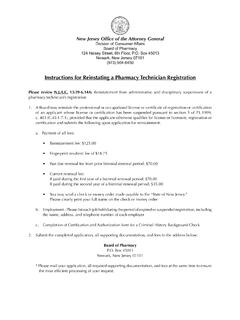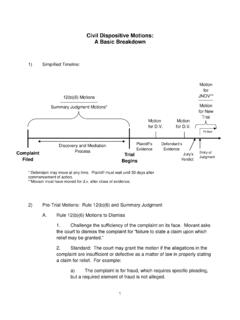Transcription of Local Court Rules - Indiana
1 Marion County Local Court Rules INDEX criminal Rules Civil Division Rules Administrative Rules Probate Rules Family Law Rules Mass Tort Local Rules Small Claims Rules Marion Superior Court criminal Rules RANDOM ASSIGNMENT OF criminal CASES CASE CONSOLIDATION LR49-CR23-102 RECORDS LR49-CR00-103 GRAND jury LR49-CR00-104 SPECIAL GRAND jury LR49-CR00-105 TRIAL Rules APPEARANCE AND WITHDRAWAL OF COUNSEL LR49-CR00-107 DISCOVERY LR49-CR00-108 BAIL LR49-CR20-109 CONTINUANCES, INITIAL HEARINGS and REVIEW OF COUNSEL REQUEST FOR GUILTY PLEA HEARING SERVICE LAW ENFORCEMENT LR49-CR00-112 MANDATORY CONSECUTIVE SENTENCES LR49-CR00-113 TRANSFER OF PRISONERS TO THE Indiana DEPARTMENT OF CORRECTIONS LR49-CR00-114 CASE DISPOSITION GUIDELINES LR49-CR00-115 FEES LR49-CR00-116 SPECIAL JUDGE ASSIGNMENTS LR49-CR00-117 SEARCH WARRANT REQUESTS MARION SUPERIOR Court criminal DIVISION Rules * Unless otherwise prescribed by another law or rule.
2 All time computations refer to business days which the Superior Court is open, pursuant to Order of Marion County Circuit Court . RANDOM ASSIGNMENT OF criminal CASES (1) Random Assignment of criminal Cases. The criminal Division of Marion County is divided into two sub-divisions: Major Felony and Misdemeanor/F6. All criminal cases filed in Marion Superior Court shall be assigned to a Court on a random and equal distribution, utilizing the following guide: (a) Major Felony Sub-Division: Courts D20, D21, D27, D28, D29, D30, D31, and D32 will equally receive all random filings for level 5 felonies, level 4 felonies, level 3 felonies, level 2 felonies, level 1 felonies, murder, class C felonies, class B felonies, and class A felonies.
3 (b) Misdemeanor/Level 6 Sub-Division: Courts D17, D18, D19, D23, D24, D25, D26, D33, D34, D35, and D36 will equally receive all random filings for level 6 felonies, class D felonies, and misdemeanors. 1. Court D22 will receive filings for all Traffic-related misdemeanor, infractions, and ordinance violations not to include offenses of Operating a Vehicle While Intoxicated. (2) Case Consolidation. Cases subject to the policies of case consolidation are exempt from the rule of Random Assignment of criminal Cases. (3) Problem-Solving Dockets.
4 If a case has been accepted into a problem-solving docket, that case will be transferred to the Court overseeing the relevant problem-solving docket. Amended effective January 1, 2021 CASE CONSOLIDATION It shall be the policy of the Marion Superior Court , that wherever possible consistent with good case management principles, cases involving the same defendant shall be consolidated into one Court for resolution of all of the pending cases. Pending as defined herein means any existing Major Felony, Class D/Level 6 Felony, or Misdemeanor case which is in pre-disposition status.
5 (a) Murder, Class A, B and C Felony Cases, and Level 1, 2, 3, 4, and 5 Felony Cases (hereinafter Major Felony case ) Any subsequently filed Major Felony case shall be assigned and/or transferred to the Court where the defendant s oldest Major Felony case is pending. Any subsequently filed Class D/Level 6 Felony or Misdemeanor case shall be assigned and/or transferred to the Court where the defendant s oldest Major Felony case is pending. In the event the defendant has an open Class D/Level 6 Felony or Misdemeanor case pending in any criminal Court and is subsequently charged with a Major Felony case, the pending Class D/Level 6 Felony or Misdemeanor case shall be transferred to the Major Felony Court .
6 In the event the defendant has an open probation case and/or open community corrections violation pending in any criminal Court and is subsequently charged with a Major Felony case, the probation case and/or open community corrections violation shall be transferred to the Major Felony Court , unless the probation case and/or open community corrections violation can be resolved without the resolution of the new Major Felony case. Cases pending in major felony drug Court and in Class D/level 6 felony drug Court are exempt from consolidation under this sub-paragraph.
7 (b) Class D/Level 6 Felony Cases Any subsequently filed Misdemeanor or Class D/Level 6 Felony case shall be assigned and/or transferred to the Court where the defendant s oldest existing Class D/Level 6 Felony case is pending. In the event the defendant has an open Misdemeanor case in any criminal Court and is subsequently charged with a Class D/Level 6 Felony case, the Misdemeanor case shall be transferred to the Class D/Level 6 Felony Court . In the event the defendant has an open probation case and/or open community corrections violation pending in any Class D/Level 6 Felony or Misdemeanor Court and is subsequently charged with a Class D/Level 6 Felony case, the probation case and/or open community corrections violation shall be transferred to the Class D/Level 6 Felony Court where the new case has been filed, unless the probation case and/or open community corrections violation can be resolved without the resolution of the new Class D/Level 6 Felony case.
8 Pending as defined herein means any existing Class D/Level 6 Felony or Misdemeanor case which is in pre-disposition status. This rule shall not apply to cases that are linked with a co-defendant. However, if one of the co-defendants is accepted into the PAIR program, the accepted defendant may be severed and transferred to the designated Mental Health Court without the non-accepted co-defendant(s) case(s). (c) Misdemeanor Cases Subject to the provisions of paragraphs (a) and (b) above, any subsequent Misdemeanor case filed against a defendant shall be assigned and/or transferred to the Court where the defendant s oldest existing Misdemeanor case is pending with the exception that Court D22 (Traffic Court ) shall not receive assignment or transfer of cases when Court D22 has the oldest pending case.
9 However, older Court D22 Traffic cases may be transferred to the Misdemeanor Court with a newer pending case. In the event the defendant has an open probation case pending in any Misdemeanor Court and is subsequently charged with a new Misdemeanor case, the probation case shall be transferred to the new Misdemeanor Court unless the probation case can be resolved without the resolution of the new Misdemeanor case. Pending as defined herein means any existing Misdemeanor case which is in pre-disposition status. This rule shall not apply to cases that are linked with co-defendants.
10 However, if one of the co-defendants is accepted into the PAIR program, the accepted defendant may be severed and transferred to the designated Mental Health Court without the non-accepted co-defendant(s) case(s). (d) Mental Health Alternative Court Cases A case in any misdemeanor or felony Court involving a defendant who may have mental illness or mental disabilities may be referred to the Mental Health Alternative Court (MHAC) to determine eligibility for admission into that Court . If eligible and provisionally accepted, the case may, at the discretion of the Judicial Officer, be transferred to the Mental Health Alternative Court .
